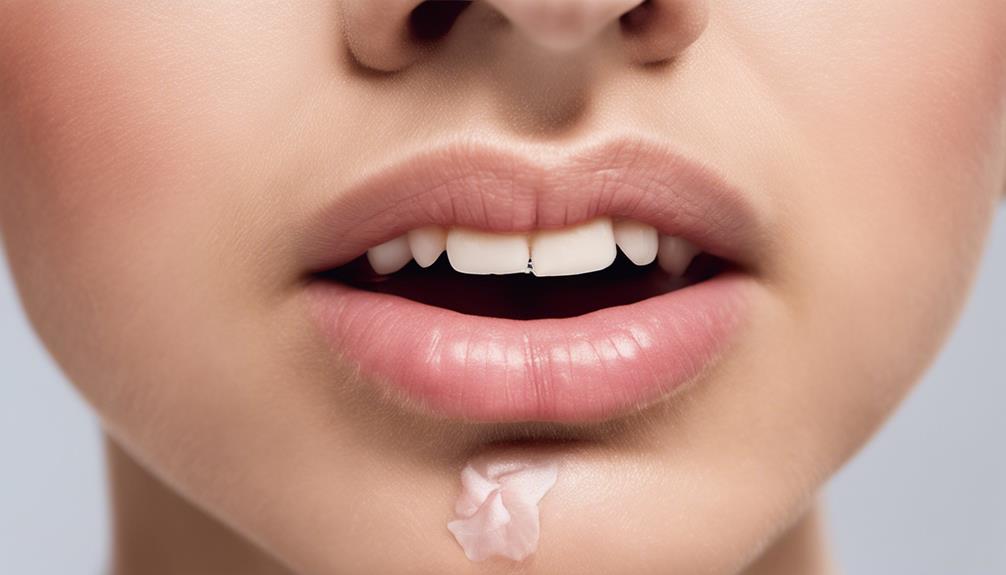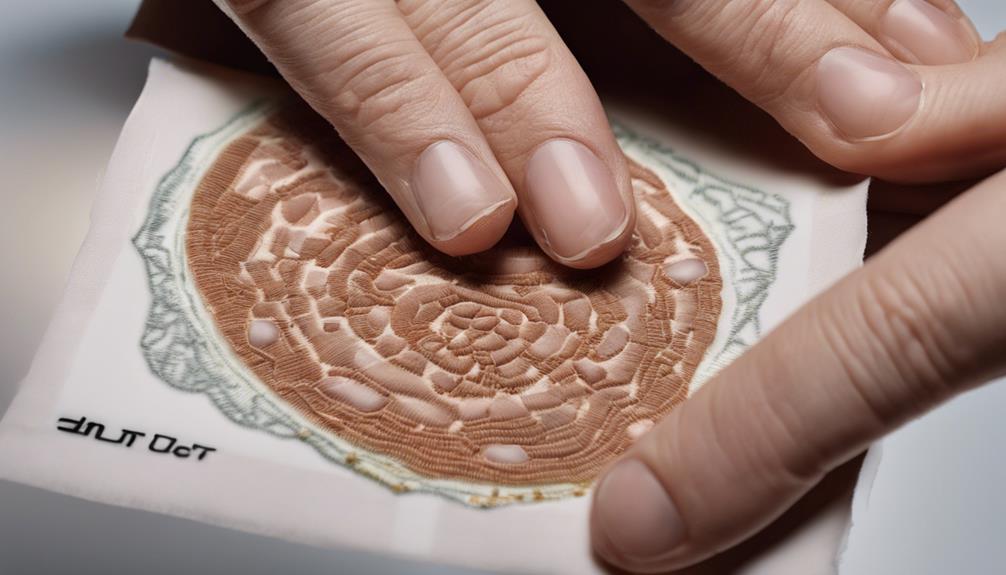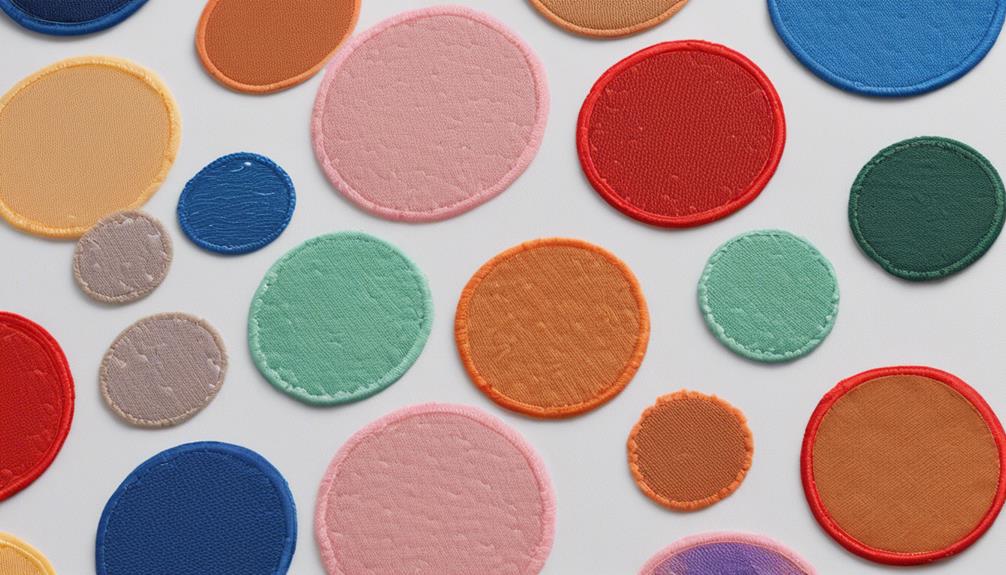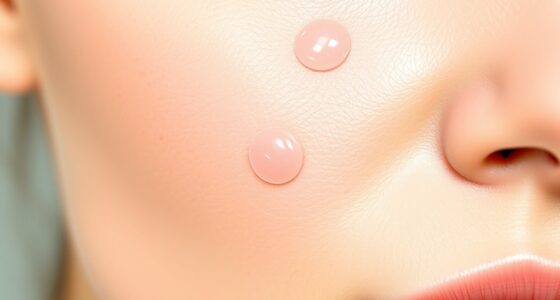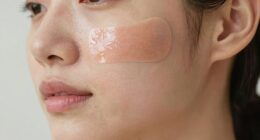Pimple patches are not recommended for treating cold sores caused by HSV-1. Cold sores require specific antiviral treatment for effective management. It is important to seek professional medical advice for accurate diagnosis and proper treatment. Using pimple patches on cold sores may worsen the condition, underscoring the need for appropriate medication tailored for cold sores. Utilize treatments specifically designed for cold sores to promote recovery and prevent complications. Understanding the difference in treatment approaches is crucial for successful management. For more information on effectively managing cold sores, explore essential considerations and tips to optimize treatment results.
Key Takeaways
- Pimple patches are not designed for cold sores caused by HSV-1.
- Cold sores require antiviral medications, not pimple patches.
- Consulting healthcare providers for cold sore treatment is essential.
- Pimple patches may not address the viral nature of cold sores.
- Proper medication tailored for cold sores is crucial for effective management.
Understanding Cold Sores and Pimple Patches
Understanding cold sores and pimple patches involves recognizing the viral nature of cold sores and the intended use of hydrocolloid patches. Cold sores, caused by the herpes simplex virus type 1 (HSV-1), are best managed with prescription antiviral medications.
While pimple patches, also known as hydrocolloid patches, are excellent for treating certain skin blemishes, they aren't the best option for cold sores. These patches are designed to absorb fluid and promote healing for acne and similar issues, rather than targeting the viral infection responsible for cold sores.
For cold sores, medical guidance is essential to determine the most effective treatment, which often involves antiviral medications. Proper diagnosis and treatment by a healthcare professional ensure that the best approach is taken to address cold sores effectively.
It's important to rely on medical expertise to navigate the healing process and choose the most suitable treatment for cold sores.
Hydrocolloid Technology Explained
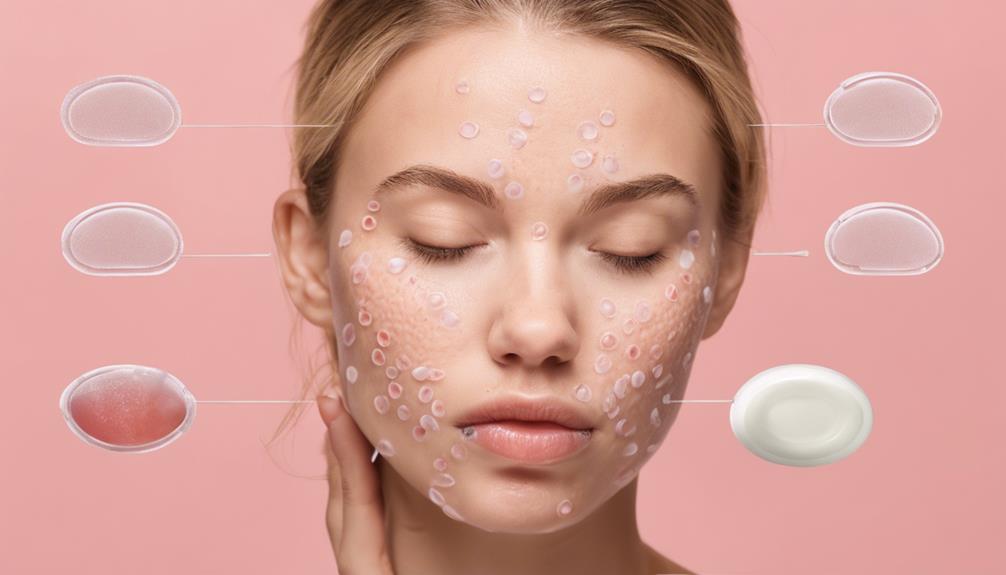
Exploring the innovative hydrocolloid technology behind these patches reveals their ability to create a germ-free healing environment for cold sores. The patches act as a virus shield, staying securely in place for up to 12 hours. The ultra-thin hydrocolloid-075 gel effectively absorbs fluids, expediting the healing process. Semi-permeable membranes allow the skin to breathe while forming a protective barrier against contaminants, aiding in a faster recovery. These patches are designed to be ultra-adhesive with tapered edges, blending discreetly with the skin for best usage.
| Feature | Description |
|---|---|
| Virus Shield | Acts as a protective barrier against viruses, aiding in the healing process |
| Germ-Free Environment | Creates an environment free from germs to promote faster cold sore recovery |
| Ultra-Thin Gel | Absorbs fluids effectively, speeding up the healing of cold sores |
| Semi-Permeable Membranes | Allows the skin to breathe while protecting against contaminants |
| Ultra-Adhesive Design | Ensures secure placement with tapered edges for discreet wear |
Benefits of Using Pimple Patches
After exploring the hydrocolloid technology behind pimple patches for cold sores, it's important to highlight the benefits of using these patches for acne treatment. Pimple patches, typically used for acne, offer several advantages. They work by absorbing the secretion from pimples, helping to reduce inflammation and prevent further infection. The hydrocolloid material in these patches creates a protective barrier that keeps bacteria out while maintaining a moist environment to promote faster healing. When used correctly, pimple patches can aid in reducing the size and redness of pimples, speeding up the overall healing process.
Although pimple patches can be beneficial for acne, it's crucial to note that they aren't suitable for treating cold sores caused by the Herpes Simplex Virus (HSV-1). Cold sores require specific antiviral treatment prescribed by a physician for effective management. Consulting a healthcare provider for the proper diagnosis and treatment of cold sores is important, rather than relying on pimple patches. Ultimately, while pimple patches have their advantages for acne, they aren't appropriate for addressing viral infections like cold sores.
How to Properly Apply Pimple Patches
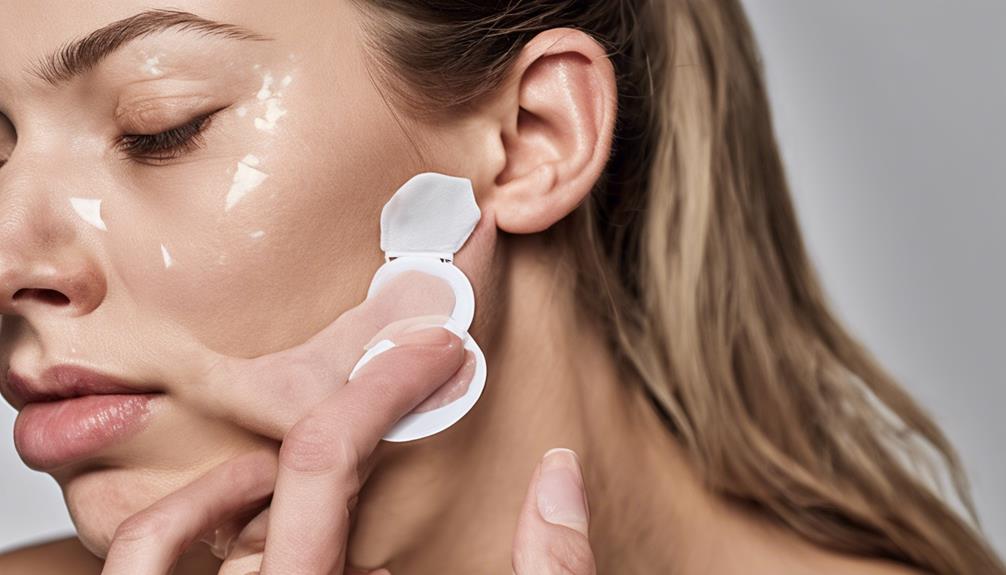
When applying pimple patches, make sure that the skin is clean and dry to promote adhesion.
Gently press the patch onto the pimple, ensuring it covers the entire affected area.
Remove the patch after the recommended time to avoid skin irritation or damage.
Patch Application Technique
To guarantee proper adherence and effectiveness, it is essential to thoroughly cleanse and dry the cold sore area before applying the pimple patch. By creating a protective barrier, pimple patches aid in maintaining moisture, which can lead to faster healing of cold sores. These patches also help prevent scabbing, resulting in a smoother and more comfortable healing process. Additionally, they absorb fluid from the cold sore, reducing inflammation and supporting the healing journey. Using pimple patches can offer similar healing times to prescription antiviral medications like Acyclovir. Below is a simple guide to assist you in properly applying pimple patches:
| Patch Application Technique | Description | Benefits |
|---|---|---|
| Cleanse and Dry Area | Prepare the skin | Optimal adhesion |
| Apply Patch | Center over cold sore | Protective barrier |
| Press Gently | Ensure secure fit | Promote healing process |
Timing and Removal
For optimal results, we recommend applying pimple patches to cold sores at the first sign of a blister. By doing so, the pimple patch can create a protective barrier, keeping the area moist and speeding up the healing process.
These patches help prevent painful scabbing on cold sores, promoting faster recovery without discomfort. You can leave the pimple patch on for up to 12 hours, allowing continuous protection and absorption of fluids from the cold sore.
When removing the pimple patch, be gentle to avoid disrupting the blister, as proper removal is essential for their effectiveness in healing cold sores. Remember, timing and proper removal play critical roles in maximizing the benefits of using pimple patches for cold sores.
Effectiveness of Pimple Patches on Cold Sores
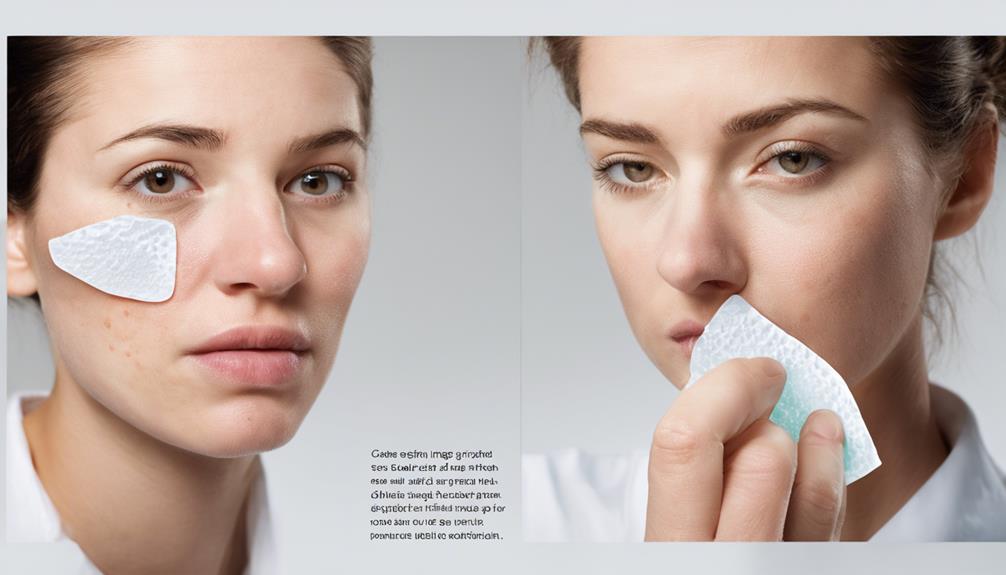
Considering the importance of pimple patches on cold sores due to their distinct cause, alternative treatment methods are essential to effectively manage this condition. Cold sores, caused by the HSV-1 infection, differ from acne and require specific care. Pimple patches, designed to treat acne, aren't suitable for cold sores and may worsen the condition.
Proper medication, such as antiviral creams or ointments prescribed by a dermatologist, is vital for faster healing of cold sores. Consulting with a healthcare professional for accurate diagnosis and appropriate treatment is key to managing cold sores effectively. While pimple patches may work well for acne, they aren't designed to address the underlying viral infection responsible for cold sores.
To promote recovery and prevent complications, it's important to use treatments specifically tailored for cold sores. By seeking the right care and following medical advice, individuals can promote healing and alleviate discomfort associated with cold sores.
Potential Side Effects and Considerations
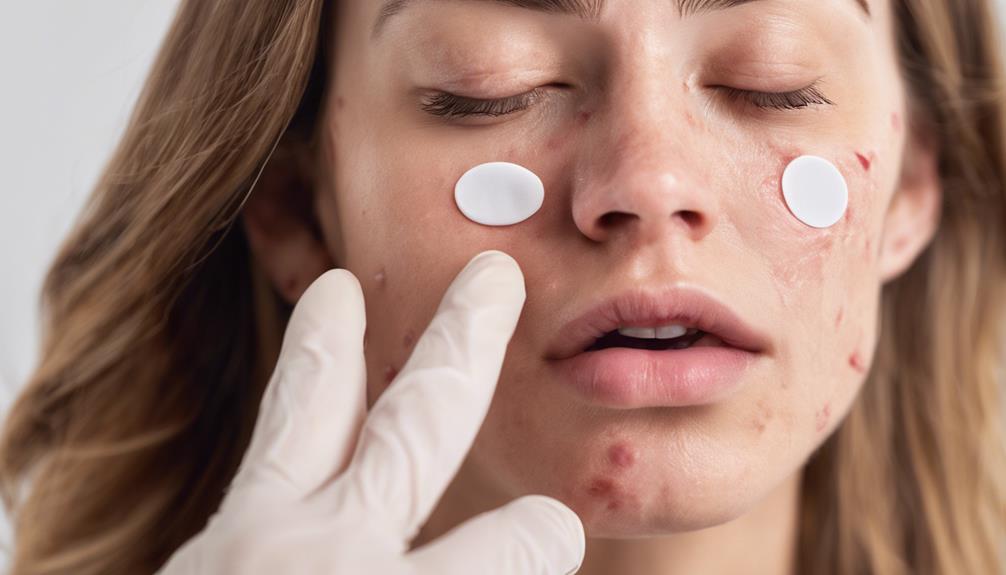
When considering pimple patches for cold sores, it's important to be aware of potential side effects, take necessary precautions, and consider safety aspects.
Understanding the overview of side effects, taking required precautions, and considering safety measures are essential before using pimple patches for cold sores.
Prioritizing safety, being cautious, and acknowledging potential side effects can help make informed decisions regarding the use of pimple patches on cold sores.
Side Effects Overview
How do potential side effects and considerations impact the use of pimple patches for cold sores?
When dealing with cold sores, caused by the herpes simplex virus (HSV-1), it's important to recognize that pimple patches aren't the recommended treatment. Cold sores require specific antiviral medication to address the viral infection effectively.
Using pimple patches may not target the root cause and could delay proper treatment. While cold sores can resolve on their own, prescription antiviral pills may speed up the healing process. Additionally, individuals often wonder, “do pimple patches really work,” as they seek effective solutions for acne management. While these patches can provide a temporary barrier and absorb excess oil, they may not address underlying issues such as hormonal imbalances or skin inflammation. For optimal results, a comprehensive skincare routine and consulting with a dermatologist can lead to more enduring solutions for both acne and cold sores.
Proper diagnosis and treatment are essential for managing cold sores successfully. Therefore, it's essential to consult a healthcare professional for an accurate diagnosis and appropriate treatment to ensure the best outcomes for cold sore management.
Precautions to Take
To ensure safe and effective management of cold sores, it's important to understand the potential side effects and considerations when using pimple patches.
When dealing with cold sores, which are caused by the HSV-1 virus, it's vital to recognize that pimple patches aren't suitable for this condition. Here are some precautions to keep in mind:
- Cold sores require specific antiviral treatments, not just hydrocolloid patches.
- Avoid mistaking cold sores for pimples; proper diagnosis is essential.
- Consult a healthcare provider before using any prescription product.
- Be cautious about using patches during active herpes outbreaks for effective healing.
- Fill out a medical intake form accurately before any treatment, even if it's a video chat consultation.
Safety Considerations
Let's prioritize safety and effectiveness by addressing potential side effects and considerations when using hydrocolloid patches for cold sores.
When dealing with herpes outbreaks, it's important to recognize that cold sores are caused by the herpes simplex virus (HSV-1), necessitating antiviral medication for proper healing. Using pimple patches may not target the viral infection effectively, potentially delaying recovery.
Thus, seeking a prescription for antiviral medication is the recommended course of action to manage cold sores safely. Inappropriate treatment, such as using pimple patches instead of antiviral medication, can worsen the condition.
To ensure the best outcome, consulting a dermatologist for a tailored treatment plan is essential to address cold sores properly and prioritize safety throughout the healing process.
Tips for Maximizing Results From Pimple Patches
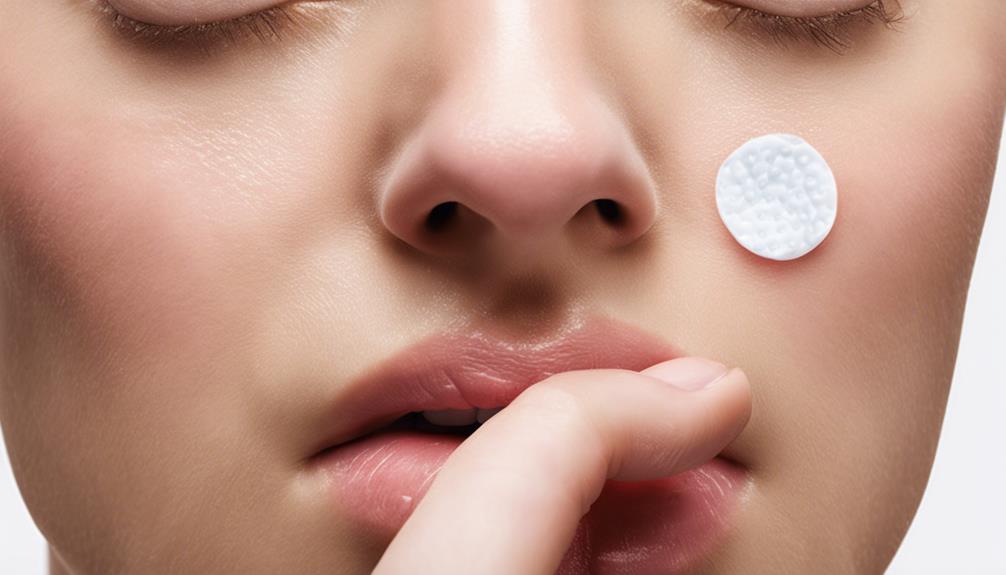
Maximizing results from pimple patches involves consistently applying them to clean, dry skin for best effectiveness. To get the most out of your pimple patches, consider the following tips:
- Cleanse your skin thoroughly before applying the patch to reduce the risk of infection and guarantee maximum adhesion.
- Apply the patch to dry skin to help it adhere better and stay in place for an extended period.
- Avoid touching or picking at the patch once it's applied to prevent any contamination and secure its efficacy.
- Change the patch regularly as per the product instructions to maintain a clean environment and promote healing.
- Consider using the pimple patch overnight for optimal results, allowing it to work undisturbed while you rest.
Frequently Asked Questions
Can Hydrocolloid Patches Help Cold Sores?
Hydrocolloid patches can indeed help cold sores by creating a healing environment that absorbs fluid and protects from bacteria. Studies show comparable healing times to prescription treatments.
The materials in these patches support tissue regrowth and blood clotting, aiding in faster healing.
Do Patches Work for Cold Sores?
Pimple patches aren't suitable for treating cold sores caused by HSV-1. Cold sores require specific medication for proper treatment. Using pimple patches on cold sores can worsen the condition.
Cold sores often heal on their own, but prescription pills may be necessary. Seeking professional medical advice for the diagnosis and treatment of cold sores is essential.
Are Pimple and Cold Sore Patches the Same?
Pimple and cold sore patches serve different purposes. Pimple patches focus on absorbing secretion to aid in quicker healing and prevent bacterial contamination, while cold sore patches create a healing environment for the sore. Using the right patch for each skin issue is vital.
Pimple patches aren't suitable for treating cold sores caused by HSV-1 infection. Understanding the distinctions between these two types of patches is necessary for effective skin care.
Do Pimple Patches Work on Sores?
Pimple patches are designed for acne, not cold sores. They may not be effective for treating sores caused by the HSV-1 virus.
Cold sores require specific oral and topical medications for proper treatment. Using pimple patches on cold sores could worsen the condition and hinder healing.
It's essential to seek medical advice and follow the prescribed treatment plan for managing cold sores effectively.
Conclusion
To sum up, pimple patches can be effective in treating cold sores by utilizing hydrocolloid technology to speed up the healing process.
While results may vary, these patches can help reduce inflammation and prevent infection. Remember to apply them properly and consider any potential side effects.
Don't let cold sores dampen your day – give pimple patches a try and see the difference for yourself!
